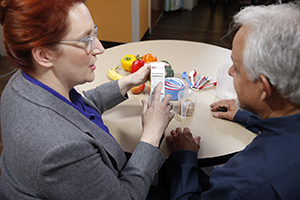Kidney Disease: Avoiding High-Sodium Foods
Sodium is a mineral that the body needs in small amounts. Sodium is found in table salt and sea salt. It's important for people with kidney disease to limit how much sodium is added to meals. Sodium is also found in high amounts in most processed foods. This means pre-prepared foods such as breakfast cereals, cookies, and pickles. It's also found in high amounts in most restaurant foods. If you aren't cooking with fresh ingredients at home, you are very likely eating more salt than you need. When you eat a lot of sodium, it can make you thirsty and cause your body to retain fluid. This can increase blood pressure and strain the kidneys.
Most adults consume about 3,400 mg of sodium a day. People with chronic kidney disease should limit their sodium to no more than 1,500 mg a day. Reading food labels and keeping a record of how much sodium you have each day are two of the best ways to figure out how much sodium is in your diet.
If you have trouble managing your sodium intake, ask your healthcare provider for a referral to a registered dietitian (RD). An RD can help you choose foods low in sodium and plan meals.

Remember, reading food labels is one of the best ways to know how much sodium you are getting. The following is a list of foods that are high in sodium.
-
Canned and processed foods, such as gravies, instant cereal, packaged noodles and potato mixes, olives, pickles, soups, vegetables
-
Cheeses, such as American, blue, Parmesan, and Roquefort
-
Cured meats, such as bacon, beef jerky, bologna, corned beef, ham, hot dogs, sandwich meats, and sausages
-
Fast foods, such as burritos, fish sandwiches, milkshakes, salted French fries, and tacos
-
Frozen foods, such as meat pies, TV dinners, and waffles
-
Salted snacks, such as chips, crackers, peanuts, popcorn, pretzels, and nuts
-
Other packaged items, such as bread, antacids, baking soda, bouillon, ketchup, lite salt, relish, salted butter and margarine, soy and teriyaki sauce, steak sauce, and vegetable juices
Online Medical Reviewer:
Marianne Fraser MSN RN
Online Medical Reviewer:
Raymond Kent Turley BSN MSN RN
Online Medical Reviewer:
Walead Latif MD
Date Last Reviewed:
1/1/2022
© 2000-2024 The StayWell Company, LLC. All rights reserved. This information is not intended as a substitute for professional medical care. Always follow your healthcare professional's instructions.